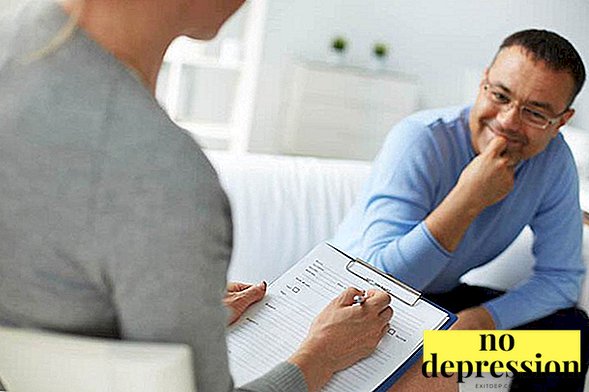Depression - mental illness, which is able to adversely affect a person's life: cause a loss of work, deduction from the university, stop communicating with loved ones.
The main symptoms of depression - depressed mood, loss of interest in what was significant before, constant fatigue - make it impossible for a person to live a full life.
But is it possible to die from depression? Of course, you can: depressed people often try to commit suicide. However, depression, even moderate, can accelerate the onset of death even without attempting suicide, as it affects physical health.
Why the disease can lead to death?

Is it possible to die from depression, neurosis, or longing?
Directly from the symptoms accompanying depression, neurosis, and other mental illnesses, you can't diebut they entail the occurrence of violations in the physical condition of a person: they lead to exacerbations of his chronic diseases, contribute to the development of deviations in the hormonal background, undermine the immune defense, adversely affect all organs and systems of the body.
According to a long-term study of foreign scientists, even moderate depression at times increases the likelihood of early death. Moreover, in women the risk of dying early is higher than in men, and is 50%.
Depression worsens the overall quality of a person’s life and negatively affects his life in society.
For example, if a lonely person who has a serious chronic illness becomes depressed and loses his job because he no longer copes with his responsibilities, he may die from the effects of their chronic illness, because he will not have enough money to buy the necessary medicines and strength to come to the doctor.
The effect of depression on a person’s physical condition:
- Violations of the cardiovascular system. Depression aggravates the course of already existing diseases of the heart and blood vessels and can lead to the development of new ones, such as arrhythmia, tachycardia, and coronary heart disease.
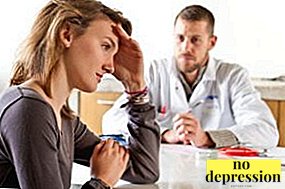 It also increases the likelihood of myocardial infarction, especially in older people, and increases by 20% the risk of dying in the first six months after a heart attack. 40-65% of people who are in the post-infarction period suffer from depression; therefore, during the recovery period, it is important that a person feels as comfortable and safe as possible and receive psychotherapeutic help if necessary.
It also increases the likelihood of myocardial infarction, especially in older people, and increases by 20% the risk of dying in the first six months after a heart attack. 40-65% of people who are in the post-infarction period suffer from depression; therefore, during the recovery period, it is important that a person feels as comfortable and safe as possible and receive psychotherapeutic help if necessary. - Oncological diseases. A quarter of people with malignant neoplasms suffer from various types of depressive disorders, developed due to the strongest psycho-emotional upheaval they experienced when they learned that they were sick. In addition, many cancer patients suffer from other mental disorders, such as PTSD, anxiety and panic disorders.
Depression undermines the work of the immune system, so the likelihood of a positive outcome is significantly reduced: the tumor grows more actively, and infectious diseases that occur in a severe form more often develop.
Also, depression during remission increases the risk of relapse.
- Decreased brain tissue. This is especially characteristic of people older than 60-65 years: a study during which a brain scan was performed showed that older people with depression had fewer areas of the brain than those who did not suffer from this disease. Also, depression, observed at a younger age, increases the risk of Alzheimer's syndrome, dementia, stroke later. And the longer and harder the disease progressed, the higher the risk.
 Diabetes. About 20% of people with diabetes also suffer from depression. This combination of diseases is extremely dangerous, since a depressed person is not able to lead the way of life that allows him to control diabetes. Therefore, the likelihood of developing complications of diabetes, such as renal failure, vascular disorders, cataracts, neuropathy, diabetic foot, increases. Depression also increases the risk of developing diabetes in those who do not have it.
Diabetes. About 20% of people with diabetes also suffer from depression. This combination of diseases is extremely dangerous, since a depressed person is not able to lead the way of life that allows him to control diabetes. Therefore, the likelihood of developing complications of diabetes, such as renal failure, vascular disorders, cataracts, neuropathy, diabetic foot, increases. Depression also increases the risk of developing diabetes in those who do not have it.- Obesity. A person with depression almost by 60% increases the likelihood of obesity, since during a depressive disorder the perception of food changes, and the person either eats very little or very much.
Also, the accumulation of body fat is affected by the hormone cortisol, which is produced more actively during depression.
- Migraine. In people with depression suffering from migraine pain, the frequency of attacks increases threefold, the effectiveness of treatment, on the contrary, decreases, and regular pain sensations further aggravate the depressive state.
Other factors affecting mortality in depression:
- Power failure. Depression can not only lead to obesity, but also to exhaustion, when a person eats very little. This causes problems in the digestive tract and other body systems, the development of avitaminosis. Also, a person in depression can go on a diet that does not require a long preparation (BP vermicelli, fast food, convenience foods) and is harmful to health.
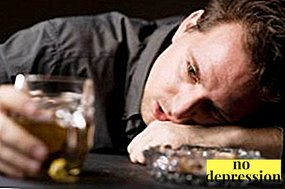 Addiction to drug addiction and alcoholism. People who are depressed may try to find a cure for their condition in narcotic substances (including alcohol), but this only leads to addiction and difficulties in real life, an increase in the number of health problems, and depression is only aggravated.
Addiction to drug addiction and alcoholism. People who are depressed may try to find a cure for their condition in narcotic substances (including alcohol), but this only leads to addiction and difficulties in real life, an increase in the number of health problems, and depression is only aggravated.- Low mobility Apathy, characteristic of a depressive state, causes hypodynamia, which also adversely affects physical well-being: blood circulation is disturbed, metabolism slows down, diseases of the joints and the cardiovascular system develop, overweight appears, the likelihood of a heart attack, stroke, atherosclerosis increases.
- Problems with cognitive functions. A person with depression worsens memory, thinking, it is more difficult for him to concentrate. This complicates his work as a specialist, increases the likelihood of error. If his work involves a risk to life (the driver of the vehicle, a worker involved in various hazardous industries, a miner, a fireman, a policeman, a military man), such problems can cause death or disability.
It is also worth mentioning suicide with depression: two thirds of all successful suicides are committed by people who have a depressive disorder, and the more severe the disease, the greater the risk that a person will try to commit suicide.
What types of illness are deadly?
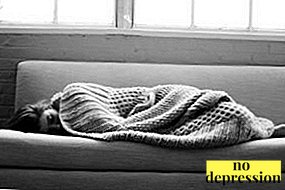
Any form of depression, if not treated, potentially dangerous and can lead to death.
The danger of depression depends not so much on its form, but on the severity and duration of the course.
However, there are some forms of depression that deserve attention:
- Hidden The symptoms of the classic depressive disorder - despondency, the feeling that everything is meaningless, the loss of interest in communication and hobby, apathy - are not typical for her. Somatic symptoms, manifested in the form of headaches, drops in blood pressure, dizziness, weakness, heart pain, and disorders of the gastrointestinal tract, come to the fore. But doctors specializing in somatic pathologies find nothing, and the disease continues to progress.
In some cases, it accompanies a person all his life, significantly reducing it.
- Bipolar. It is characterized by mood swings: depressive symptoms are periodically replaced by manic. A person who could barely get out of bed yesterday, is full of plans, his mood is inadequately elevated, he does not feel the need for sleep and loses the sense of time. The manic period quickly passes, and depression returns. In parallel, there may be delirium, hallucinations.
- Endogenous. Its occurrence is associated with a violation in the production of hormones that affect mood. This is a rather rare form of depression, which often arises against the background of complete peace of mind, when traumatic factors are absent.
- Psychotic. Depressive symptoms are combined with symptoms of psychosis: hallucinations, delusions, depersonalization, and others. People with psychotic depression are more likely to commit suicide.
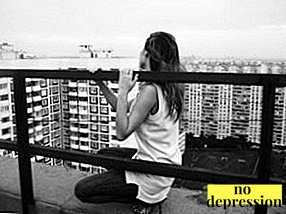
The severity of depression and its duration are of great value in risk assessment.
If depression is mild or moderate, its effect on the body is quite mild, but the more severe it is, the higher the risk of suicide and the stronger its influence on physical well-being.
What to do to not die?
To avoid the many complications of a depressive disorder, It is important to start treatment as soon as possible..
A person with depression is chosen a special drug treatment, which reduces the severity of symptoms and increases the effectiveness of psychotherapy.
Can be assigned:
- antidepressants (Azafen, Coaxil);
- benzodiazepines (diazepam, phenazepam);
- neuroleptics (Sonapaks, Aminazin);
- Nootropics (Nootropil, Fenotropil);
- hypnotics (Sonmil, Donormil);
- vitamins;
- sedatives (Valerian tablets, Fitoed).
Drugs are prescribed based on the patient's symptoms and can be replaced by others in the course of treatment.

Most effective In the treatment of a depressive disorder, cognitive-behavioral psychotherapy is considered, which allows achieving recovery in a short time.
Other types of psychotherapy are also used, such as gestalt therapy, art therapy, hypnotherapy.
Tips for psychologists for people suffering from depression:
- Always be aware that depression is not a weakness or a personality trait, but a complete illness that needs to be treated.
Attitude to it as a weakness does not bring the patient closer to recovery, but only aggravates his condition and increases his sense of worthlessness.
- Try not to keep emotions in yourself: repressed emotions can negatively affect the mental state. This advice is also useful for people who do not suffer from depressive disorders.
- Remember that therapy does not give instant results. Continue to drink medicine and follow the recommendations of the attending physician.
- Try to keep yourself from falling to the bottom of the depression. Try even in trifles to make a choice not in its favor: overpower yourself and get out of bed, even if you do not want, eat, even if there is almost no appetite, and more often do what you liked to do before.
Practical recommendations in the fight against depressive disorderwhich may be useful in combination with other therapies:
- try to break off communication with people who cause discomfort;
- more often try to be in the fresh air;
- activity is always more useful than inaction, so try yourself and try to work, do what you like, meet friends;
 do not drive yourself: always try to rest enough;
do not drive yourself: always try to rest enough;- exercise regularly;
- try to level the day regimen and carefully follow it;
- adjust the diet so that it has more healthy foods.
The sooner the treatment for depression is started, the less it will harm both mental and somatic human health, so it is necessary at the first symptoms to seek help.
Depression - stretched in time, suicide. Death trend:

 It also increases the likelihood of myocardial infarction, especially in older people, and increases by 20% the risk of dying in the first six months after a heart attack. 40-65% of people who are in the post-infarction period suffer from depression; therefore, during the recovery period, it is important that a person feels as comfortable and safe as possible and receive psychotherapeutic help if necessary.
It also increases the likelihood of myocardial infarction, especially in older people, and increases by 20% the risk of dying in the first six months after a heart attack. 40-65% of people who are in the post-infarction period suffer from depression; therefore, during the recovery period, it is important that a person feels as comfortable and safe as possible and receive psychotherapeutic help if necessary. Diabetes. About 20% of people with diabetes also suffer from depression. This combination of diseases is extremely dangerous, since a depressed person is not able to lead the way of life that allows him to control diabetes. Therefore, the likelihood of developing complications of diabetes, such as renal failure, vascular disorders, cataracts, neuropathy, diabetic foot, increases. Depression also increases the risk of developing diabetes in those who do not have it.
Diabetes. About 20% of people with diabetes also suffer from depression. This combination of diseases is extremely dangerous, since a depressed person is not able to lead the way of life that allows him to control diabetes. Therefore, the likelihood of developing complications of diabetes, such as renal failure, vascular disorders, cataracts, neuropathy, diabetic foot, increases. Depression also increases the risk of developing diabetes in those who do not have it. Addiction to drug addiction and alcoholism. People who are depressed may try to find a cure for their condition in narcotic substances (including alcohol), but this only leads to addiction and difficulties in real life, an increase in the number of health problems, and depression is only aggravated.
Addiction to drug addiction and alcoholism. People who are depressed may try to find a cure for their condition in narcotic substances (including alcohol), but this only leads to addiction and difficulties in real life, an increase in the number of health problems, and depression is only aggravated. do not drive yourself: always try to rest enough;
do not drive yourself: always try to rest enough;
